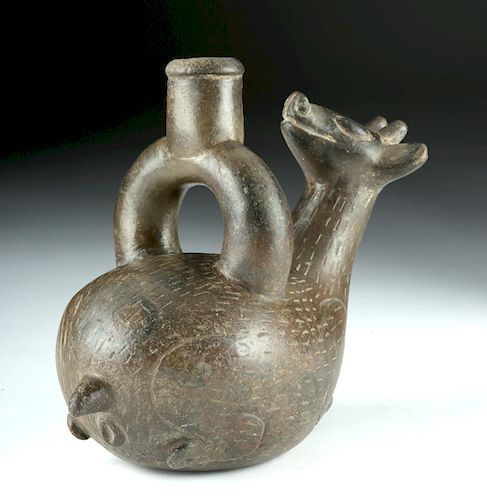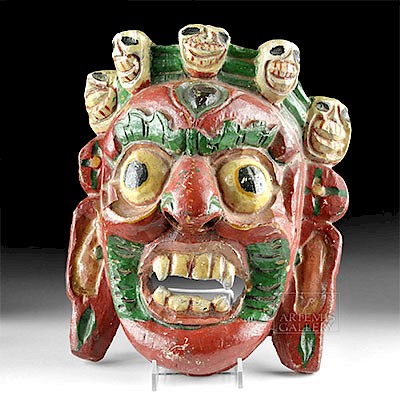Chavin Pottery Stirrup Vessel - Deer Form
Lot 41
About Seller
Artemis Fine Arts
686 S Taylor Ave, Ste 106
Louisville, CO 80027
United States
Selling antiquities, ancient and ethnographic art online since 1993, Artemis Gallery specializes in Classical Antiquities (Egyptian, Greek, Roman, Near Eastern), Asian, Pre-Columbian, African / Tribal / Oceanographic art. Our extensive inventory includes pottery, stone, metal, wood, glass and textil...Read more
Estimate:
$1,700 - $2,550
Absentee vs Live bid
Two ways to bid:
- Leave a max absentee bid and the platform will bid on your behalf up to your maximum bid during the live auction.
- Bid live during the auction and your bids will be submitted real-time to the auctioneer.
Bid Increments
| Price | Bid Increment |
|---|---|
| $0 | $25 |
| $300 | $50 |
| $1,000 | $100 |
| $2,000 | $250 |
| $5,000 | $500 |
| $10,000 | $1,000 |
| $20,000 | $2,500 |
| $50,000 | $5,000 |
| $100,000 | $10,000 |
| $200,000 | $20,000 |
About Auction
By Artemis Fine Arts
Apr 25, 2019
Set Reminder
2019-04-25 10:00:00
2019-04-25 10:00:00
America/New_York
Bidsquare
Bidsquare : Pre-Columbian | Tribal | Ethnographic
https://www.bidsquare.com/auctions/artemis-gallery/pre-columbian-tribal-ethnographic-4035
Featuring ancient and ethnographic art from around the world, including Pre-Columbian, Native American, African / Tribal, Ethnographic, Spanish Colonial, Fossils, Fine Art, much more. Artemis Fine Arts info@artemisgallery.com
Featuring ancient and ethnographic art from around the world, including Pre-Columbian, Native American, African / Tribal, Ethnographic, Spanish Colonial, Fossils, Fine Art, much more. Artemis Fine Arts info@artemisgallery.com
- Lot Description
Pre-Columbian, north coast of Peru, Chavin culture, ca. 900 to 200 BCE. A beautiful ceramic stirrup vessel in the form of a captive deer. The deer lies on his back, his legs hidden beneath his rotund body, his erect phallus projecting from the back of the vessel. His head is raised, a serene look on his face despite his bulging eyes. His body is scored with lines designed to give him the appearance of coarse fur. A squat, thick stirrup handle rises from the center of his belly, topped by a short spout with a thick rim. A vessel like this one may have been used ceremonially for holding chicha (maize beer) and for pouring libations onto the earth or storing them in the grave. Size: 8" W x 7" H (20.3 cm x 17.8 cm)
The Chavin people lived in the northern Highland Andes, and their capital, Chavin de Huantar, is an UNESCO World Heritage Site. The artwork of Chavin represents the first widespread style in the Andes, inspirational to later cultures, especially the Moche. Although the meaning behind their iconography is not known, the deer was likely associated with sexuality and fertility because of its prominent antlers and the yearly cycle of shedding them.
Provenance: private Hawaii, USA collection; ex-private New York, USA collection
All items legal to buy/sell under U.S. Statute covering cultural patrimony Code 2600, CHAPTER 14, and are guaranteed to be as described or your money back.
A Certificate of Authenticity will accompany all winning bids.
We ship worldwide and handle all shipping in-house for your convenience.
#139217Handles, head, and phallus have been reattached and expertly restored. Restoration is very well done and almost impossible to see. Light surface wear commensurate with age.Condition
- Shipping Info
-
All shipping is handled in-house for your convenience. Your invoice from Artemis Gallery will include shipping calculation instructions. If in doubt, please inquire BEFORE bidding for estimated shipping costs for individual items.
-
- Buyer's Premium



 EUR
EUR CAD
CAD AUD
AUD GBP
GBP MXN
MXN HKD
HKD CNY
CNY MYR
MYR SEK
SEK SGD
SGD CHF
CHF THB
THB
















